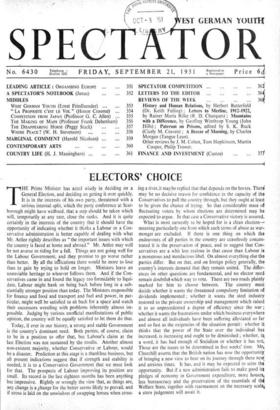ELECTORS' CHOICE
THE Prime Minister has acted wisely in deciding on a General Election, and deciding on getting it over quickly. It is in the interests of his own party, threatened with a serious internal split, which the party conference at Scar- borough might have widened, that a step should be taken which will, temporarily at any rate, close the ranks. And it is quite certainly in the interests of the country that it should have the opportunity of indicating whether it th'inks a Labour or a Con- servative administration is better capable of dealing with what Mr. Attlee rightly describes as " the important issues with which the country is faced at home and abroad." Mr. Attlee may well be not averse to riding for a fall. Things are not going well for the Labour Government, and they promise to go worse rather than better. By all the intications there would be more to lose than to gain by trying to hold on longer. Ministers leave an unenviable heritage to whoever follows them. And if the Con- servatives came in and found the legacy too formidable to liqui- date, Labour might bank on being back before long in a sub- stantially stronger position than today. The Ministers responsible for finance and food and transport and fuel and power, in par- ticular, might well be satisfied to sit back for a space and watch their successors wrestling with problems inherently almost im- possible. Judging by various unofficial manifestations of public opinion, the country will be equally satisfied to let them do that.
Today, if ever in our history, a strong and stable Government is the country's dominant need. Both parties, of course, claim to be in a position to offer that, but Labour's claim at the last Election was not sustained by the results. Another almost non-existent majority, whether Conservative or Labour, would be a disaster. Prediction at this stage is a thankless business, but all present indications suggest that if strength and stability is needed, it is -to a Conservative Government that we must look for that. The prospects of Labour improving its position are small. Its record in the last eighteen months has been anything but impressive. Rightly or wrongly the view that, as things are, any change is a Fhange for the better seems likely to prevail, and iff stress is laid on the unwisdom of swapping horses when cross- ing a river, it maybe replied that that depends on the horses. There' may be no decisive reason for confidence in the capacity of the Conservatives to pull the country through, but they ought at least to be given the chance of trying. So that considerable mass of fluctuating voters by whom elections are determined may be expected to argue. In that case a Conservative victory is assured.
'What is most earnestly to be hoped for is a clean election meaning particularly one from which such terms of abuse as war- monger are excluded. If there is one thing on which the endeavours of all parties in the country are ceaselessly concen- trated it is the preservation of peace, and to suggest that Con- servatives are a whit less zealous in that cause than Labour is a monstrous and mendacious libel. On almost everything else the parties differ. But on that, and on foreign policy generally, the country's interests demand that they remain united. The differ- ences On other questions are fundamental, and no elector need remain doubtful. which way to vote. There are two roads plainly marked for him to choose between. The country must decide whether it wants the threatened compulsory limitation of dividends implemented ; whether it wants the steel industry restored to the private ownership and management which raised it to so unprecedented a degree of efficiency since the war ; whether it wants the frustrations under which business everywhere and almost all individuals have been suffering alleviated so far and so fast as the exigencies of the situation permit: whether it thinks that the power of the State over the individual has increased, is increasing and ought to be diminished ; whether, it a word, it has had enough of Socialism or whether it has not„, Those are the issues to be determined in five weeks' time. Mr( Churchill asserts that the British nation has now the opportunity of bringing a new view to bear on its journey through these new and anxious times. It has, and it may be expected to seize the opportunity. But if a new administration fails to make good its pledges of economy in Government expenditure, more houses4 less bureaucracy and the preservation of the essentials of th4 Welfare State, together with rearmament on the necessary scale] a stern judgement will await it.


































